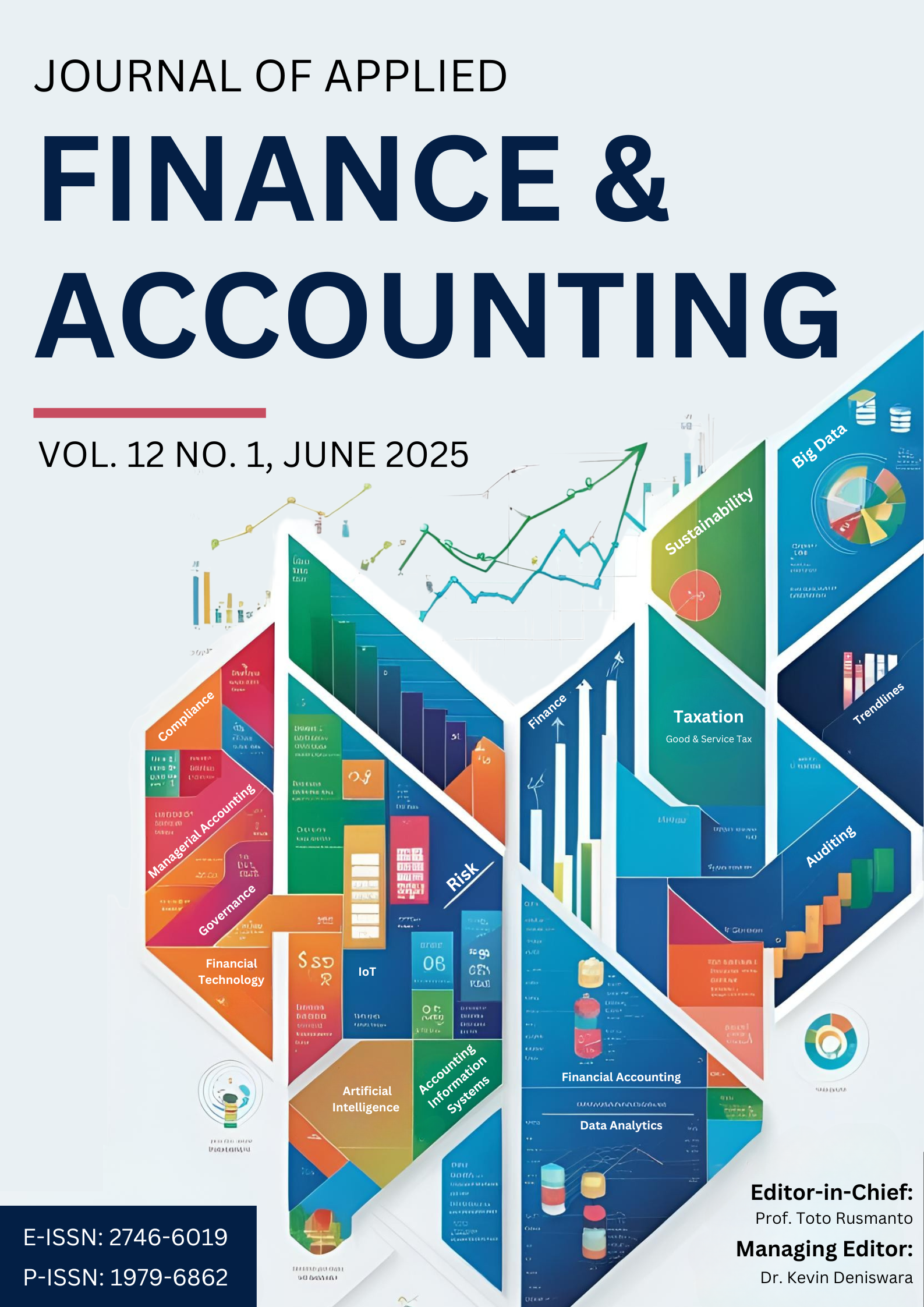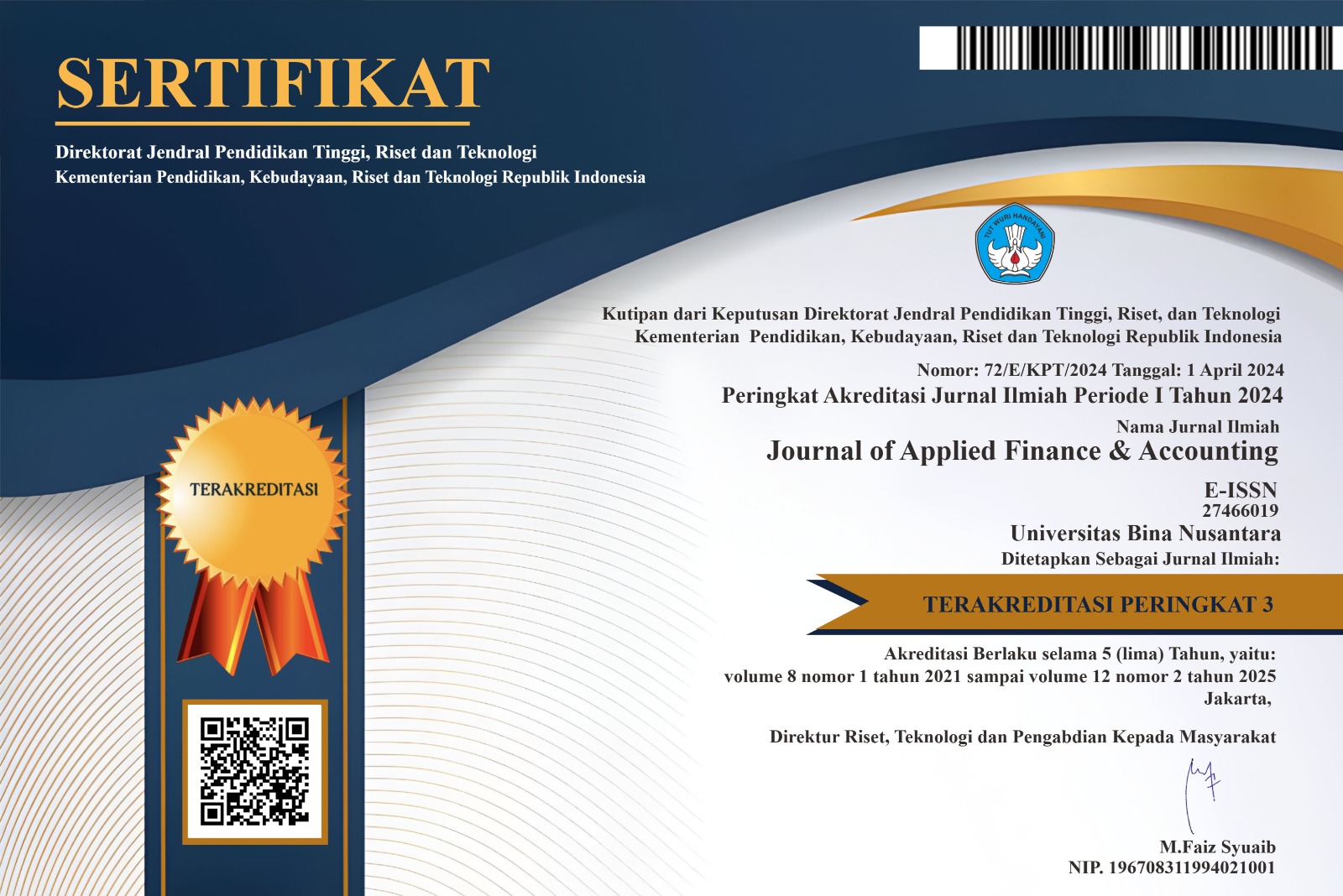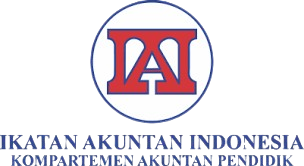A COMPARATIVE ANALYSIS OF PUBLIC SECTOR AUDITING: THE GAMBIA AND INDONESIA
DOI:
https://doi.org/10.21512/jafa.v12i1.13316Keywords:
Public Sector Auditing, Accountability & Transparency, Governance, Audit Obstacles, Administrative Structures, Auditing StandardsAbstract
This study offers a comparative analysis of public sector auditing in The Gambia and Indonesia, focusing on how centralised versus decentralised governance structures influence audit effectiveness. A qualitative comparative case study approach was applied, using semi- structured interviews with audit professionals and document analysis of national audit laws, reports, and international standards. Data were analysed thematically to uncover patterns related to political interference, resource limitations, technological constraints and institutional capacity. Key findings indicate that The Gambia’s centralised system suffers from limited audit independence, weak legal protections, and poor documentation practices. In contrast, Indonesia’s decentralised structure results in inconsistent standards, regional technology gaps, and uneven training access. Both countries experience political interference and inadequate professional development, which undermine audit quality. The research contributes to the literature by linking governance structure to audit effectiveness and institutional transparency. It offers practical implications for policymakers, including the need for legal reforms, investment in digital infrastructure, improved public engagement, and standardised training programs. These findings support governance reforms aimed at strengthening accountability and sustainable development in emerging economies.
References
Achumie, G. O., Bakare, O. A., & Okeke, N. I. (2024). Post-project financial auditing as a continuous improvement tool for SMEs Post-project financial auditing as a continuous improvement tool for SMEs. November. https://doi.org/10.53022/oarjms.2024.8.1.0053
Acim, Subagja, D. J., Afiani, D. A., Pratama, G. R., & Al Kautsar, F. (2023). Exploring Cultural Diversity in Indonesia : Models , Responses , and Multicultural Politics. CANDIDATE: Jurnal Sains Politik, 1(1), 35–55.
Agu, & Eneiga, &. (2024). Governance and Anti-Corruption Measures in Nigeria: Strategies for Enhancing Transparency, Accountability and Public Trust. International Journal of Economics and Public Policy | IJEPP, 8(1), 16. https://doi.org/10.5281/zenodo.12576796
Al Qahtani, S., Phan, D. H. T., Kend, M., & Alghasham, O. M. A. (2024). The Implementation of the KAM Reforms in Saudi Arabia: Stakeholder Perspectives on the Audit Expectations Gap. International Journal of Auditing, 243–259. https://doi.org/10.1111/ijau.12368
Al-Sukker, A., Abdel-Qader, W., Tibbits, G., & Shbeilat, M. (2024). How External Auditors Evaluate Internal Audit Effectiveness: An Experimental Study of the Case of Jordan. International Journal of Academic Research in Business and Social Sciences, 14(8), 2462–2493. https://doi.org/10.6007/ijarbss/v14-i8/22622
Alamsyah, A., Kusuma, G. N. W., Ramadhani, D. P., Demamu, A. Y., Rahardja, F., Choi, L. K., Wijaya, R. C., Sunarjo, R. A., Info, A., Engagement, U., Growth, B., Startups, D., Business, S., Quraishi, M. K., Jahan, N., Habib, M., Shafeen, Y. H., Xiao, T., Geng, C., … Giuseppe Grossi Examiner Elin Smith, S. (2024). Digital transformation and the public sector auditing: The SAI’s perspective. Financial Accountability and Management, 13(2), 1= 6. https://doi.org/10.3390/fi16030076
Ashari, M. M. (2025). Accrual Accounting Compliance Drivers : An Indonesian Public Sector Study. 9(1), 17. https://doi.org/10.21070/jas.v9i1.1931
Azinogo, B. K., & Erasmus, L. J. (2025). Corporate Governance Challenges and Their Impact on Public Sector Auditing in Africa : An Exploration of Effectiveness , Accountability , and Transparency. Journal of Accounting, Finance and Auditing Studies, 01-04–2025, 1–14.
Bondarenko, M., Lushnei, S., Paniv, Y., Molchanovsky, O., Romanyshyn, M., Filipchuk, Y., & Kiulian, A. (2025). Sovereign Large Language Models: Advantages, Strategy and Regulations. 1–48. http://arxiv.org/abs/2503.04745
Boufounou, P., Eriotis, N., Kounadeas, T., Argyropoulos, P., & Poulopoulos, J. (2024). Enhancing Internal Control Mechanisms in Local Government Organisations: A Crucial Step towards Mitigating Corruption and Ensuring Economic Development. Economies, 12(4), 21. https://doi.org/10.3390/economies12040078
Budiarto, A. Y. (2022). Audit Expectation Gap Debates: To What Extent Audit Expectation Gap Defence Auditors? Business Economic, Communication, and Social Sciences (BECOSS) Journal, 4(1), 47–57. https://doi.org/10.21512/becossjournal.v4i1.7790
Ceesay, L. O. (2020). Institutional Sustainability in the Context of International Donor Funded Programs in Fragile and Post-Conflict Communities of West Africa.
Committee, C. B., Board, G., Bank, I. D., Sharing, K., Committee, K. S., Online, M., Course, O., Supreme, C., & Institutions, A. (2022). List of Acronyms African Organization of Supreme Audit Institutions. 22.
Conteh, S. (2021). Audit expectation GAP in the public sector of the Gambia. The Indonesian Accounting Review, 11(02-December-2021), 15. https://doi.org/10.14414/tiar.v11i2.2489
Conteh, S., & Hamidah, H. (2021). Audit Expectation GAP in The Public Sector of The Gambia. The Indonesian Accounting Review, 11(2), 127–141. https://doi.org/10.14414/tiar.v11i2.2489
Creation, W. (2023). Entrepreneurial Higher Education Education, Knowledge and Wealth Creation. 136.
Delina, R., & Demeter, G. (2024). Exploring Multidimensional Big Data Analytics in Procurement for Detecting Collusion. IDIMT 2024: Changes to ICT, Management, and Business Processes through AI - 32nd Interdisciplinary Information Management Talks, 329–336. https://doi.org/10.35011/IDIMT-2024-329
Dominguez-blanco, G. (2020). COMPARATIVE STUDY OF THE QUALITY OF RISK DISCLOSURES IN.
Eltweri, A., Faccia, A., Do, D. T., Dang, V. S. T., Pham, V. D., Le, V. L., Dang, V. S. T., Jarva, H., & Zeitler, T. (2023). administrative sciences International Standards on Auditing ( ISAs ) Adoption : An Institutional Perspective. 7(3), 307–317. https://doi.org/10.1108/JAAR-12-2021-0333
Eltweri, A., Faccia, A., & Foster, S. (2022). International Standards on Auditing (ISAs) Adoption: An Institutional Perspective. Administrative Sciences, 12(3). https://doi.org/10.3390/admsci12030119
Frenken, K., Waes, A. Van, Pelzer, P., & Smink, M. (2019). Safeguarding Public Interests in the Platform Economy. Policy & Internet, 10(2), 1–26. https://doi.org/10.1002/poi3.217
Grossi, G., Hay, D. C., Kuruppu, C., & Neely, D. (2023). Changing the boundaries of public sector auditing. Journal of Public Budgeting, Accounting and Financial Management, 35(6), 140–153. https://doi.org/10.1108/JPBAFM-05-2023-0079
Hanafi, M. A. A., Yatim, N. M., & Salim, A. S. A. (2024). Unveiling the transition: Factors influencing true and fair view reporting in the accrual-based accounting migration of Malaysian federal statutory bodies. Asian Economic and Financial Review, 14(5), 389–409. https://doi.org/10.55493/5002.v14i5.5071
Hardiyanti, V., Damanik, S., & Widiastuti, Y. (2024). The 7 th International Seminar on Business , Economics , Social Science , and THE INFLUENCE OF AUDIT OPINIONS AND BPK AUDIT FINDINGS ON PERFORMANCE NORTH SUMATRA HIGH PROSECUTOR ’ S OFFICE The 7 th International Seminar on Business , Economics , Social Sc. 4.
Holili, M., & Khoiroh, W. (2023). The Role of Financial Audits in Strengthening Accountability and Transparency in Funding Management. 01(01), 37–47.
Jallow, O. (2019). THE REALITY OF AUDITORS ’ INDEPENDENCE IN THE GAMBIA - CONFRONTING THE KEY PLAYERS. 22–30.
Khaled, Z. E. L., & Mcheick, H. (2019). Case studies of communications systems during harsh environments: A review of approaches, weaknesses, and limitations to improve quality of service. International Journal of Distributed Sensor Networks, 15(2). https://doi.org/10.1177/1550147719829960
Lubis, H., Pratama, K., & Safrida. (2022). HR related antecedes to Sustainability reporting in Indonesian public listed firm: The mediating role of employee committeemen. Cuadernos de Economia, 45(128), 87–97. https://doi.org/10.32826/cude.v1i128.710
Maroun, W., & Maroun, W. (2016). Not all experts are equal in the eyes of the International Auditing and Assurance Standards Board : On the application of ISA510 and ISA620 by South African registered auditors. 1–13.
Mpofu, F. y. (2023). The application of Artificial Intelligence in external auditing and its implications on audit quality? A review of the ongoing debates. International Journal of Research in Business and Social Science (2147- 4478), 12(9), 496–512. https://doi.org/10.20525/ijrbs.v12i9.2737
Mujahid, A., & Abdullah, S. (2024). Analysis of Planning and Budget Consistency on The Quality of Government Agency Performance Accountability Reports in the Simeulue Districta. 3(7), 2965–2986.
Muzurura, J., & Mutambara, E. (2022). EFFECTIVE SUPREME AUDITING INSTITUTIONS, SOUND PUBLIC FINANCE MANAGEMENT AND NATIONAL DEVELOPMENT: LESSONS FOR ZIMBABWE’S OFFICE OF AUDITOR GENERAL. Humanities and Social Sciences Letters, 10(3), 223–237. https://doi.org/10.18488/73.v10i3.3017
Nazarwin, Manik, Y. M., Sudirman, A. N., & Lubis, I. S. (2025). Enhancing Audit Quality: Key Factors and the Role of Rewards in Government Internal Audits at the Financial Audit Agency of North Sumatra. Journal of Ecohumanism, 4(1), 792–806. https://doi.org/10.62754/joe.v4i1.5873
Ojewale, V., Steed, R., Vecchione, B., Birhane, A., & Raji, I. D. (2024). Towards AI Accountability Infrastructure: Gaps and Opportunities in AI Audit Tooling. In CHI Conference on Human Factors in Computing Systems (CHI ’25), April 26-May 1, 2025, Yokohama, Japan (Vol. 1, Issue 1). Association for Computing Machinery. https://doi.org/10.1145/3706598.3713301
Oussii, A. A., & Boulila Taktak, N. (2018). The impact of internal audit function characteristics on internal control quality. Managerial Auditing Journal, 33(5), 450–469. https://doi.org/10.1108/MAJ-06-2017-1579
Owusu-Aning, R. (2010). Towards the Paperless Office: Best Practices and Exploration of Enterprise Rights Management Solutions for Ghanaian Business Processes. April.
Patnaik, S., & Pandey, S. C. (2019). Case Study Research. Methodological Issues in Management Research: Advances, Challenges, and the Way Ahead, November 2019, 163–179. https://doi.org/10.1108/978-1-78973-973-220191011
Payne, S. (2025). Designing and Conducting Qualitative Studies. Health Psychology in Practice, 12(10 April 2025), 9. https://doi.org/10.1002/9780470694008.ch7
Phirke, A., Ghorpade-aher, J., Ameen, I., Student, M., Wahhab, A., Puthukulam, G., Ravikumar, A., Vinod, R., Sharma, K., Meesaala, K. M.,
Grossi, G., Hay, D. C., & Neely, D. (2023). Best Practices of Auditing in an Organization using ISO 27001 Standard. 6(53), 1184–1190. https://doi.org/10.55643/fcaptp.6.53.2023.4266
Pramono, A. J., & Wibisono, W. (2022). The Role Of Sai In Strengthening National Institutions Towards Sdgs Realization : Case Study Of Bpk. 6(9), 13.
Puthukulam, G., Ravikumar, A., Sharma, R. V. K., & Meesaala, K. M. (2021). Auditors’ perception on the impact of artificial intelligence on professional skepticism and judgment in oman. Universal Journal of Accounting and Finance, 9(5), 1184–1190. https://doi.org/10.13189/ujaf.2021.090527
Riyadi, T., & Suhadasyah, M. A. (2025). The Effect Of Objectivity , Independence and Professional Ethics on Audit Quality. 13(1). https://doi.org/10.37641/jiakes.v13i1.3216
Saidy, L., Jobe Authors Lamin Saidy, A., Jobe, A., & Giuseppe Grossi Examiner Elin Smith, S. (2023). IMPACT OF AUDITING IN GOVERNMENT AGENCIES: THE CASE OF GAMBIA Title Impact of Auditing in Government Agencies: The Case of Gambia. www.hkr.se
Šalienė, A., Tamulevičienė, D., & Tvaronavičienė, M. (2024). Focus of performance audit recommendations on the approach of public value creation: The case of the National Audit Office of Lithuania. Journal of International Studies, 17(4), 1–28. https://doi.org/10.14254/2071-8330.2024/17-4/1
Sampurna, Dr. Agung Firman, : Dr. Agus Joko Pramono. (2021). The Audit Board.BPK-strategic-foresight.pdf (Vol. 11, Issue 276). http://search.proquest.com.ezproxy.library.yorku.ca/britishperiodicals/docview/8307872/138205591DF7B3C3778/35?accountid=15182
Savin, A., & Trzaskowski, J. (2014). Transparency International in search of a constituency: The franchising of the global anticorruption movement. Research Handbook on EU Internet Law, 1–2. https://doi.org/10.4337/9781782544173.00007
Shaban, O. S., Barakat, A. I., Mökander, J., Morley, J., Taddeo, M., Floridi, L., Oommen, J. G., Roy, N. S., Brittoraj, R. D., & Muzurura, J. (2023). Exploring the Landscape of Energy Audits : A Bibliometric Analysis. Science and Engineering Ethics, 14(3), 223–237. https://doi.org/10.18488/73.v10i3.3017
Sukmadilaga, C., Pratama, A., & Mulyani, S. (2015). Good Governance Implementation in Public Sector: Exploratory Analysis of Government Financial Statements Disclosures Across ASEAN Countries. Procedia - Social and Behavioral Sciences, 211, 513–518. https://doi.org/10.1016/j.sbspro.2015.11.068
Talib, S. A., Hasnan, S., Rohmah, A., Hussain, M., Ali, M. M., & Ismail, R. F. (2024). Determinants of Asset Misappropriation in Small and
Medium Enterprises : Evidence from Malaysia. November 2023, 1–12. https://doi.org/10.53935/jomw.v2024i1.269
Vahlevi, N. J., & Hafidz, J. (2024). Legal Review of Expert Evidence in Calculation of State Losses Originating from the Prosecutor ’ s Internal Auditor. 3(3), 584–612.
Vega-jim, D., Aguado-correa, F., & Jos, J. (2023). Evaluation of non- fi nancial information and its contribution to advancing the sustainable development goals within the Spanish banking sector. 29(June 2020). https://doi.org/10.1016/j.iedeen.2022.100211
Warren Krafchik & Anjali Garg. (2025). Quantum Finance and Structural Transformation of Less Developed Countries. Https://Link.Springer.Com/, 03 April 2025, 1–33.
Westberg, C. (2000). The role of information technology in improving public transport systems. Industry and Environment, 23(4), 20–23.
Downloads
Published
Issue
Section
License
Authors who publish with this journal agree to the following terms:
Authors retain copyright and grant the journal right of first publication with the work simultaneously licensed under a Creative Commons Attribution License that allows others to share the work with an acknowledgement of the work's authorship and initial publication in this journal.
Authors are able to enter into separate, additional contractual arrangements for the non-exclusive distribution of the journal's published version of the work (e.g., post it to an institutional repository or publish it in a book), with an acknowledgement of its initial publication in this journal.
Authors are permitted and encouraged to post their work online (e.g., in institutional repositories or on their website) prior to and during the submission process, as it can lead to productive exchanges, as well as earlier and greater citation of published work (See The Effect of Open Access).





